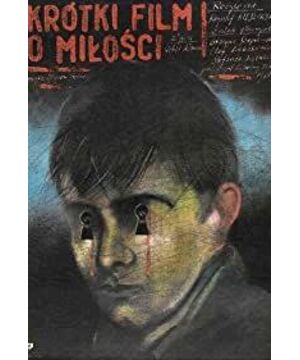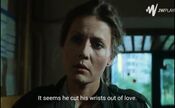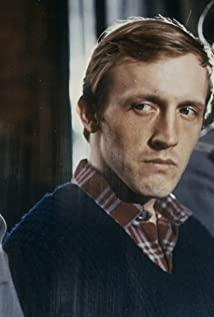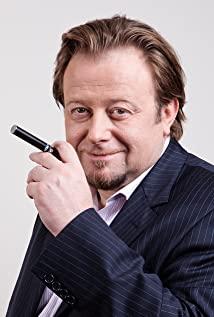Story-"A Short Film About Love" is a movie edited version of Kieslovsky's "Ten Commandments" series-"The Commandments". In Poland in the 1980s, a chaotic world swayed along political and ideological lines and lost values and beliefs. "We are living in a difficult time. Everything in Poland is chaotic. No one knows exactly what is right and what is wrong. No one even knows why we have to live. Maybe we should go back and look for those who teach people. How to live, the simplest, the most basic, and the most primitive principles of survival." This is the original intention of Kieslowski in filming the "Ten Commandments" series.
Kieslowski never preached, and never even thought about politics, because those would not tell people what to do after getting up. The "Ten Commandments" in the scriptures is only a name he occasionally borrowed. He hoped that his lens would capture ordinary people who occasionally enter the lens, so he set the story of the "Ten Commandments" in the current Warsaw, a In the residential area with thousands of windows, the characters have their own emotions, anger, sorrow, and life experience, and they may live in the next door or adjacent building. The protagonist in this episode will pass by the protagonist in the other episode, or say hello to each other when they go out in the morning! Although "The Ten Commandments" is divided into ten episodes, this kind of overall temporal air-conditioning and inexhaustible temporal and spatial connections make us understand that many things are inadvertently interrelated and affect each other.
Tomek, a nineteen-year-old boy, works at the post office. He fell in love with Magda, a thirty-year-old female painter who lives in the building opposite. After Magda returned at night, Tomek began to peer into Magda's life through a single-tube telescope. When Magda got close to her lover, Tomek stopped prying. In order to meet Magda, Tomek applied to deliver milk every morning; to talk to Magda, Tomek forged the remittance notice and asked Magda to pick it up at the counter where he was.
One day, Tomek saw Magda crying alone in the binoculars, only to tell her that he had forged the money order and spied on her. Magda asked Tomek why he wanted to spy on her. Tomek replied, "Because I love you!" Tomek's insistence on "love", Magda gave him repeated chuckles and told him the word. It's long outdated. Tomek finally came to Magda’s residence, Magda guided him to put his hands into her thighs, and calmly told him: "This is all about love!"
Tomek cut his wrists, which was deeply stimulated. suicide. Magda has since fallen into remorse, and she waited hard for Tomek to be discharged from the hospital...
Space·View-
By chance, Tomek fell in love with Magda who lived in the building opposite him, but was an ignorant boy , A mature woman, how is such love possible? So the way to express love turned out to be-peeping. This behavior that is despised in the modern moral and ethics has become a real way for the characters to try to communicate in the film. Every night, when Tomek sits in front of the telescope as if performing a solemn ritual, that moment is the beginning of his true life. In lighting treatment, a beam of parallel light always hits the eyes of the characters. In these peeping eyes, we can't see any uncleanness or sordidness. What we see is a simple but we don't know how to express it correctly. In love!
In the first two thirds of the film, from the perspective of space, Tomek is all peeping at Magda. The director uses a telephoto lens to simulate the telephoto effect in Tomek’s perspective. The lens has never directly entered the Magda. Filming at the residence of Da, the window here acts as a limitation of the picture frame. It defines our field of view, and we can only watch but not listen-Magda’s life is like a silent film unfolding in front of Tomek’s eyes . It's just the distance between the two buildings, but the communication between the characters requires telescopes. This not far away spatial distance on the one hand highlights the barriers in the living conditions of modern people, on the one hand, it limits Tomek's relationship with Magda. learn. And it is precisely because of the limitation of this distance that everything can still retain the room for imagination, and the incomplete beauty can still be made up in sincere miss!
Tomek’s perspective actually coincides with the director’s camera. Under the silent film carefully scheduled by Kieslowski, in the theater, sitting on a chair, and watching this film "About In "The Short Film of Love", do we think a little bit about our own perspective? Have you noticed the layered structure that the director ambushes-Tomek is peeping at Magda’s life, and we sit as the audience What are you peering at in that dark corner? This can't help but trigger our thinking about the cinema mechanism and the psychology of watching movies.
Through the telescope, it is actually a camera. We can see that Magda is single but not only overnight. She seems very happy. As a painter, she naturally knows how to decorate her life with her colors, so bright and vibrant red is everywhere. , The red sheets, the red sofa, the red phone (meaning that in Tomek’s humble residence, the only touch of red is a piece of red cloth on the binoculars!) But once, Tomek saw Magda, who returned late, went back to her residence alone after a quarrel with her lover in the community. She started to cry with her head in her arms! Some people say: When a person gets lost, he tends to run more frantically! When Magda used a blockbuster of red to promote her indulgent life, Tomek knew that she was not happy!
When Tomek defrauded Magda to the post office by using a forged bill of exchange again, Magda was humiliated by the post office officer and accused her of forging the bill of exchange to swindle money! (Kieslowski inadvertently scanned the Polish bureaucratic government agencies with the camera) Seeing Magda being insulted for her stupidity, Tomek was excited and told her the truth-it was himself In order to see her, he faked the money order and tricked her to come to the post office. Looking at Magda's bewildered back, he suddenly shouted out: "You cried yesterday!" So an infamous secret love behavior was exposed!
That night, Magdamin knew that Tomek was watching her, but she spread her red sheets and undressed from the sudden lover. She wanted Tomek to be a shameless voyeur to punish him. the behavior of! Strange humans-apart from being high-grade animals with hairless two legs, humans are the only animals that punish others by hurting themselves!
In the early morning of the next day, Tomek went to Magda to deliver milk. Magda, who had been waiting, asked him why he was peeping at him. The two started a conversation under the red window glass in the corridor:
——Why are you observing me ?
——Because...Because I love you. real! I love you!
(The voices of both of them are lowered.)
——Then...what do you want?
--I have no idea.
——Do you want to kiss me?
——No
——Do you want to make love to me...want to make love to me?
——No
——Maybe you want me to travel with you? To the Masurischen waterfront or to Budapest?
(Tomek shook his head) ——Then
what do you want to do?
——Don’t do anything!
——Don’t do anything! ?
(Magda looks at him confusedly)
-Nothing.
(Tomek runs away suddenly and then comes back) ——I
can,...Can I ask you to sit out, have some coffee or something?
Magda accepted the invitation-this did not appear directly on the screen, the condensed editing made the next shot is Tomek running happily in the camera shot! At this moment, in the "Ten Commandments" series, the "silent witness" who appears whenever the protagonist's destiny is about to take a turn for the first time meets Tomek in this episode, but his eyes have Kind of uneasy worry! For this "silent witness", Kijeslovsky did not give any explanation. Of course, this person is not a god. It does not matter who he is! A master’s movie is never a classic Hollywood narrative model. The director is not omniscient and omnipotent. He doesn’t need to explain everything because he himself can’t. As a visual art, film is limited in space by the screen frame-we cannot see the space outside the frame (that is, the lens of the camera, the screen of the cinema), which is different from the narrative mode of classic Hollywood movies (closed The composition, the omniscient and omnipotent director, no matter how tortuous the story, at the end of the film, the director will let the audience understand all the cause and effect), Kieslowski repeatedly let this "silent witness" and the "Ten Commandments" The protagonist passes by. On the one hand, it breaks through the limitations of the picture frame and makes us feel that the development of the ten episodes is related in time and space; on the other hand, the most important thing is that the director should guide us to understand this kind of survival. Situation—When your destiny takes a turn, maybe someone who you didn’t pay too much attention to witnessed this turn. Although this kind of living situation cannot be explained, it is not surreal, it is a kind of Real reality!
After dinner together, Tomek finally came to Magda’s residence, the world he had always yearned for but never entered the other side of the world, all the imagination and longing became reality at this moment, and Magda who came out of the bath made a move. The hair movement, and asked Tomek if he saw her doing this. Tomek said no, Magda told him with a meaningful smile, "Nothing is repeated!"
What happened next was the embarrassing scene. The reason why Magda accepted Tomek's invitation and brought him back to the residence was to let Tomek understand what "love" is in her way! The distance of the space is gone, and the image of the goddess collapses! Tomek, deeply excited and humiliated, ran back to his residence. On the way, Tomek once again passed by the "silent witness", looking at each other, as if they had known each other before! In the end, Tomek used a sincere and reckless act that could only be done at his age-suicide, to bury his broken love!
But since then, the perspective of peeping has changed. Magda shook her head in a sense of loss, she pulled out an incompetent telescope and began to look at Tomek's residence! Unlike her lovers who can be called A or B, she asked Martin's mother and the old postman repeatedly about Tomek's name and read it out! Two details: A change in visual styling, Magda curled up her uninhibited long hair for the first time in the film; a strange action, waiting for the night, she held her head and tightened her legs Bent to the chest, a posture that looks like when a fetus is in the womb-it is also the most primitive posture when humans are looking for safety and warmth! In this way, everything turned around. Magda waited day and night for Tomek to return from the hospital with a telescope at the window, because she wanted to tell him: Tomek, you are right!
"I think this movie is short, but coherent. I find the most interesting thing about it is its shooting angle. We watch it through the point of view of the loved one, not the loved one, the loved one Just some fragments, some objects. This love is very hard for the boy and the woman afterwards. So we have been seeing this love through the eyes of the tortured, and this love has always been with Tribulation and unattainability are closely linked." Kieslovsky said.
Time·End——
Human time is one-dimensional, time passes day by day, and the day of yesterday cannot stay. From the perspective of the length of time, Magda is ahead of Tomek. There is no doubt that there was a stage where Magda is now Tomek, but slowly, after experiencing too much love, she no longer believes Love, what she believes is only the demand behind love, "What do you want?" was the first question she threw to Tomek before he asked him the name! When Tomek told her seriously what he wanted, Magda only shook her head and laughed! She told Tomek with a naked injury what he should need, and Tomek responded to Magda's guidance in a decisive way.
Although time is one-way, the time between people affects each other, and the impact has never been a dimension! We don’t know who or what affected Magda’s previous life. We only know that, at this time, with the change of peeking perspective, it is not Tomek but Magda who thinks she knows it, suddenly aware. What do you need! After encountering Tomek, Magda's time has the possibility of turning around-towards a young and simple direction that he has experienced before!
But the rational and pessimistic director never let Tomek appear in Magda's sight again, he disappeared! Analyzing from a rational point of view, we know that Tomek probably no longer believes in love. When another girl confesses to him one day, he will tell her what love is in this way! At the end of the TV version, Magda came to the post office and saw Tomek, who had just been discharged from the hospital, but Tomek smiled and told her: "I will never spy on you again!"
Kijeslovsky Point out: This is closer to my view of real life.
But the actress has reservations about this ending. Life is bad enough. People cannot get such a sad ending when they go to the cinema. People need a story! The actress has the right to give her opinion. Kieslowski agreed to her request, and filmed the ending of the movie version, a ending that the film critics called "immaculate": Magda came to Tor Tomek, who had just returned from the hospital, was still asleep at Maek’s residence. Magda sat where Tomek used to peep at her, a beam of parallel light hit her eyes, and she began to look through Tomek’s telescope. Looking at my residence in the distance, the perspective of space has undergone a wonderful change!
Combining the imagination of the characters, the dimension of time is blurred, and the scene of Magda holding her head and crying appears on the lens. The difference is that a person walks gently in the depth of field, that is Tomek, and he strokes his hand. On Magda’s shoulder, Magda raised her head and slowly stretched her hand to Tomek’s face...
Movie·Warmth—
Although people gave unreserved praise to Kieslovsky’s film , But this "moral anxiety" master has repeatedly emphasized that he doesn't like making movies! The reason may be as he himself claims-he doesn't know what else he can do besides making movies, and making movies is really exhausting, and he, an impatient person, has to keep hiding this from people. One disadvantage.
When shooting this "short film about love", while guiding the actors how to move, Kieslowski strongly felt the absurdity of his profession, "just like an idiot!" and ended the "red" After shooting, the master felt that he could no longer add anything to his movie, so he just wanted to lie on a chair and smoke his favorite cigarette and enjoy the afternoon sun.
Although the reason Kieslovsky gave to the world is true, we may be able to feel that facing a more chaotic, undirected and worthless post-modern society, thorough suspicion and pessimism are the masters. The underlying reason for denying yourself and laughing at yourself.
However, Kijeslovsky told us again: On the streets of Berlin, an old woman recognized him. She cried and told him, because she watched his "Love Short Film", she had been with him for five or six years. She regarded her as a stranger's daughter and kissed her for the first time. "Undoubtedly, they will still be noisy tomorrow, maybe this movie will be nothing to them after two days, but if they can feel better for 5 minutes,...that's enough, just for those 5 minutes, this A movie is worth making!"
"My favorite audiences are those who say that the movie is about them. Those who say that the movie has a certain meaning to them, those who have changed something because of the movie." Lovesky said.
We can imagine that the master felt the comfort and warmth!
Postscript: Afterwards, Kieslowski left suddenly, just as he himself had judged the deaths of many characters-"They died, probably because they could no longer survive!" But the salary Passing all fire, more fortuitous opportunities (thinking about contingency and uncertainty is one of the consistent themes of the master’s movies), in another time and space, in another cultural desert where values and beliefs are more empty, one in The anxious young man in his own life accidentally encountered the master's world of light and shadow. "The Ten Commandments", "Red", "White", and "Blue", every time you watch, you will always get a kind of piercing warmth and comfort in the rush of legs and feet, and the hard work of food and clothing, but at a loss!
Film theory master Bazin once told us meaningfully: "Film has changed life, but life is still life after all!" The world is sinister and the wind is bitter. Although pessimistic people continue to be pessimistic, absurd people still have to write something here. Ridiculous text. No way, the master's movie is too beautiful and too warm!
View more about A Short Film About Love reviews








